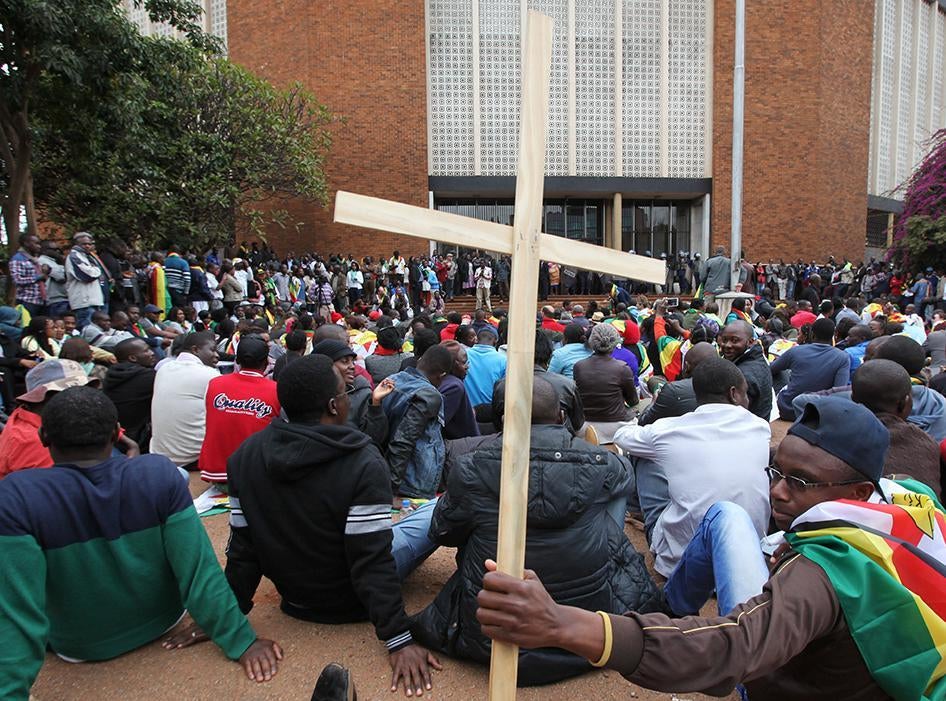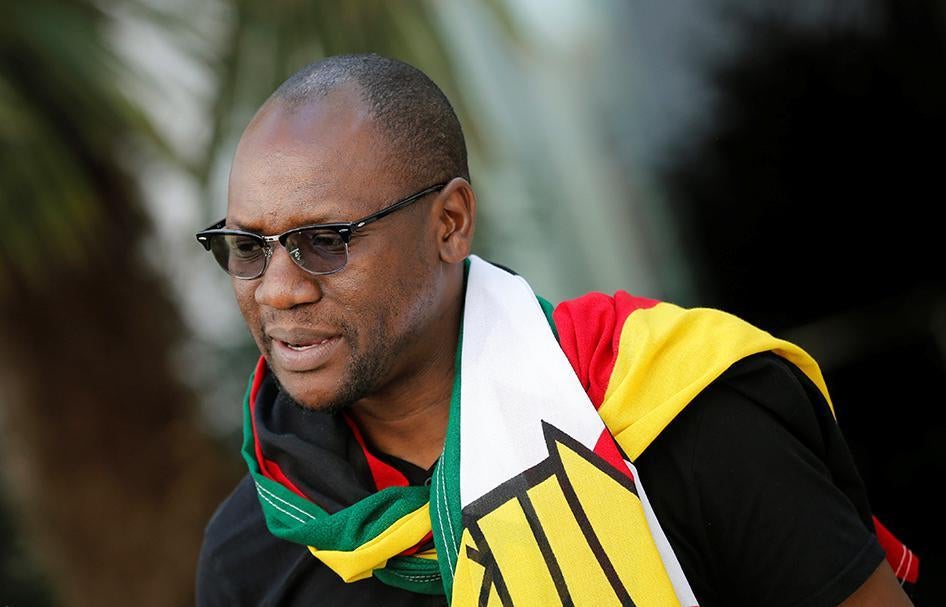Last month, in a small, inconspicuous café in Johannesburg, I listened as Pastor Evan Mawarire broke down and wept as he told me how Zimbabwean authorities harassed and persecuted him for daring to speak out against repression and rights abuses in his country.
Mawarire’s courageous #ThisFlag campaign has galvanised ordinary Zimbabweans from all walks of life to openly criticise President Robert Mugabe’s government over deteriorating economic conditions, corruption, and rights violations.
Mugabe’s long rule has been marked by a litany of abuses against thousands of people, few of whom have received any justice.
“People who claimed to be State agents called and threatened me with certain death,” Mawarire said. “I fear for my life, and the lives of my pregnant wife and two kids.”
Mawarire’s experience, which is sadly not unique, signals Zimbabwe’s return to an ugly past characterised by political repression, harassment of activists, and disregard for basic rights.
Since June, numerous non-governmental groups have engaged in over a dozen public protests across the country.
The police responded with heavy-handed tactics, indiscriminately using water cannons, teargas, and batons to violently crush generally peaceful protests.
Hundreds of people were injured and scores were arrested and charged with public violence.
In the face of coordinated harassment that included arrest on false charges of treason and public violence, Mawarire fled to the United States via South Africa together with his family.
His departure weakened his campaign but was inevitable as he was confronted with the might of the regime’s repressive apparatus.
Mawarire’s fears are well-founded. Despite constitutional guarantees of free expression and association and Zimbabwe’s international human rights obligations to protect these rights, authorities have been unwilling to tolerate any dissent or criticism.
In March 2015, Itai Dzamara, a pro-democracy activist, was forcibly disappeared and is still missing.
In one of our last discussions before his abduction, Dzamara told me he wanted to mobilise Zimbabweans for mass action against Mugabe’s long and oppressive rule, inspired by the Arab Spring protests that toppled dictators in Tunisia, Egypt and Libya.
Dzamara had already petitioned Mugabe to resign and to reform the electoral system.
Two days before he was abducted, Dzamara addressed a large rally of the opposition MDC party led by Morgan Tsvangirai, where he openly called for mass protests against Mugabe’s government.
On the International Day for the Disappeared on August 30 this year, I sat in the crowd at Wits University in Johannesburg where Dzamara’s wife, Sheffra, spoke of her fear and agony at not knowing where her husband was.
In a hushed, breaking voice, and with tears flowing down her face, she said: “All I want is for my husband to be allowed to come back home unharmed. Our two small children ask me daily: When is daddy coming home? I have no answer.”
Dzamara’s family, like many Zimbabweans, suspect the involvement of State security agents in the abduction of the man who dared petition Mugabe to step down and permit free elections.
Senior government officials have denied any State involvement in his disappearance.
As rumours swirl yet again about Mugabe’s health, the battle to succeed the 92-year-old in the ruling Zanu PF party and in the government, is exacerbating political repression as various party factions jockey for position.
Former Zanu PF spokesperson Rugare Gumbo once told me he believed the majority in Zanu PF are in favour of reforms and genuine democratic rule, but “they are forced to live under a cloud of fear because of surveillance and intimidation from State security agents.”
The State security forces are keenly focused on the succession, which has made them a stumbling block to genuine reforms.
Mugabe’s presidential endorsement for 2018 appears to reflect a consolidation of his grip on the party and government and an effort to keep the status quo.
Dzamara’s disappearance, police brutality in clamping down on protests, and the lack of justice and accountability for violations signal an unwillingness to curtail serious rights abuses, strengthen democratic institutions, and restore the rule of law. And instead of fully implementing the rights guarantees in the new Constitution, party sources say, the aim now is to amend the Constitution to remove some human rights protections.
As Zimbabwe falls apart, its neighbours in the Southern African Development Community (Sadc) are burying their heads in the sand.
Sadc leaders met in Swaziland for their 36th summit in late August and completely ignored Zimbabwe’s disastrous human rights situation.
Sadc leaders should publicly assert themselves and press the Zimbabwean government to respect its obligation to protect all citizens. They should push Zimbabwe to ensure justice for past abuses and undertake reforms including the amendment or repeal of repressive legislation and the full implementation of the Constitution. They should urgently call for a full investigation into Dzamara’s enforced disappearance.
From the US where he feels his family is safe, Mawarire says he will continue to press for reforms and accountable government in Zimbabwe.
His campaign plans to protest against Mugabe’s government in New York at the UN General Assembly from September 17 to 19.
Without institutional reforms and a peaceful resolution of the Mugabe succession, as well as the establishment of genuine respect for the basic rights of all Zimbabweans, long-term, sustainable development and stability in Zimbabwe may prove elusive. The Zimbabwe authorities should heed calls made by Itai Dzamara, Mawarire, and many others, for freedom and a better life for all.









